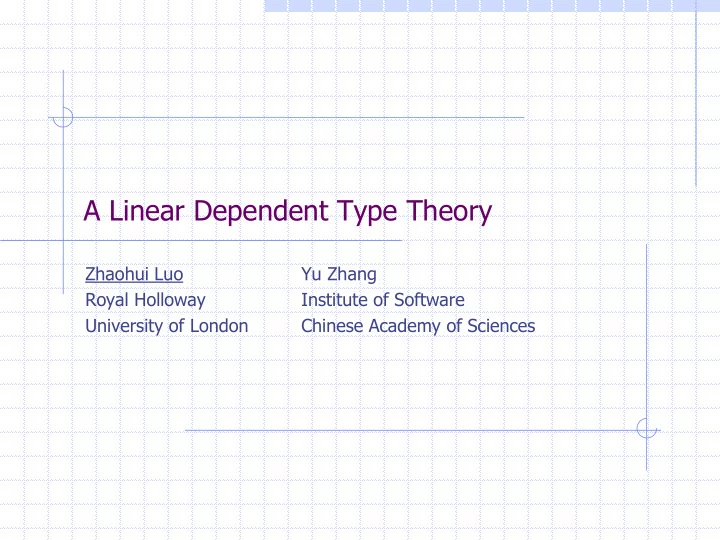

A Linear Dependent Type Theory Zhaohui Luo Yu Zhang Royal Holloway Institute of Software University of London Chinese Academy of Sciences
Linear types and dependent types Linear types (Girard 1987): A - º B Dependent types (Martin-Löf 1970s): x:A.B[x] How to combine them? In most of existing work (Pfenning et al 2002, Krishnaswami et al 2015, Vákár 2015) B[x] only when x is intuitionistic. Hence it is possible to separate intuitionistic Γ and linear Δ : Γ ; Δ |- a : A Δ depends on Γ , but not the other way around. McBride (2016) “Prices” in contextual entries and typing and allow type dependency on 0 -priiced variables – discussion later. Independent with this work (we became aware of Conor’s work only two weeks ago – detailed comparison due.) This paper: LDTT, where types can depend on linear variables. May 2016 TYPES 2016 2
LDTT: Linear and Intuitionistic Variables Contexts are sequences of two forms of entries: x:A, y::B[x], z:C[x,y], … Intuitionistic variables x : A Linear variables y :: B Types dependent on linear variables Example: x::A, f : A - º A - Eq A (f x, x) type May 2016 TYPES 2016 3
Intuitionistic -types – the intuitionistic part of context Γ = Γ \ FV LD ( Γ ) – removing the linear dependent variables FV LD ( ) = FV LD ( Γ ,x:A) = FV LD ( Γ ) if FV(A) FV LD ( Γ ) = ; = FV LD ( Γ ) {x} otherwise FV LD ( Γ ,x::A) = FV LD ( Γ ) {x} Example: Γ ≡ x:A, y::B, z:C ≡ x:A, z:C if y FV(C) ≡ x:A, if y FV(C) May 2016 TYPES 2016 4
Linear -types Merge( Γ ; Δ ) is only defined if (the intuitionistic parts are the same) FV LD ( Γ ) FV LD ( Δ )= ( Γ / Δ do not share linear dependent variables) When the above are the case, Merge is defined as: Example: Γ ≡ x:A, y 1 ::B 1 , z:C Δ ≡ x:A, y 2 ::B 2 , z:C Merge( Γ ; Δ ) ≡ x:A, z:C, y 1 ::B 1 , y 2 ::B 2 Note: y 1 y 2 and y 1, y 2 FV(C) for otherwise, Merge( Γ ; Δ ) would be undefined. May 2016 TYPES 2016 5
Equality Types Formation rule merge( Γ ; Δ ) is defined only when var-sharing is OK: x?A Γ , x?B Δ A ≡ B and ? is both : or both :: merge( Γ ; Δ ) is defined as Examples: x::A, f : A - º A - f x : A and x::A - x : A x::A, f : A - º A - Eq A (f x, x) type x::A - x : A and y::A - y : A x::A, y::A - Eq(x,y) type May 2016 TYPES 2016 6
Introduction and elimination rules May 2016 TYPES 2016 7
Variable Typing where Γ’ intuitionistic means that it does not have linear ::-entries D Γ (x) is defined as: x D Γ (x); For any y D Γ (x), FV( Γ y ) D Γ (x). Examples: Judgements derivable intuitionistically are derivable. x::A,y:B(x) | - x:A and x::A,y:B(x) | - y:B(x) are derivable since x B(x). x::A, x’::A, y:B(x) | - y : B(x) is not derivable if x’ B(x). May 2016 TYPES 2016 8
Other Rules (for completeness) Context validity Context permutation rule: Conversions and conversion rule: May 2016 TYPES 2016 9
Weak Linearality Defn (essential occurrences) Let Γ |- a:A. The multiset E Γ (a) of variables essentially occurring in a under Γ is inductively defined as follows (Eq-types omitted): Variable typing: -typing: Intuitionistic applications: Linear applications: Theorem (weak linearality) In LDTT, every linear variable occurs essentially for exactly once in a well-typed term. Formally, Γ , y::B, Γ’ | - a : A y E Γ, y::B, Γ’ (a) only once. May 2016 TYPES 2016 10
Implementation Type checking algorithm Follows the traditional algorithm for type inference/checking. Decidability, if assuming meta-theoretic results (expected). Prototype implementation in Haskell Merging oprns correspond to splitting oprns. Available online: https://github.com/yveszhang/ldtyping May 2016 TYPES 2016 11
Related Work Work on linearity in dependent types Eg, (Pfenning et al, I&C02), (Krishnaswami et al, POPL15), (Vákár, FoSSaCS 15) Lambek calculus with dependent types (Luo, TYPES 2015) Types in all above are non-dependent on linear/Lambek variables McBride 2016 (Walder Festschrift) More general setting: considering “prices” in {0,1,w}: 1 x 1 : A 1 , … n x n : A n |- a:A and different -types ( x:A) B: ( x:A) B corresponds to intuitionistic -types (1x:A) B corresponds to linear -types T ype dependency B[x] only on “0 - priced” variables x. Independent with the current work and comparison to be done. May 2016 TYPES 2016 12
Future Work LDTT: allowing types to depend on linear variables Simplicity LDTT gives a “straightforward” extension with linearality cf, McBride’s work, analysis to be done Examples of reasoning to be done with our prototype implementation Extension to other linear/Lambek type constructors May 2016 TYPES 2016 13
Recommend
More recommend